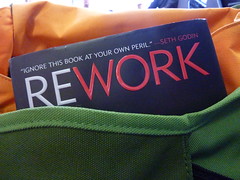I was driving in my car the other day and this ad comes on the radio. I believe it was an ad for action.gc.ca where they had new regulations for credit card fine print and terms and conditions changes.
The radio ad had one man pleading for the credit card holder to give him another chance, much like when a husband is found guilty of something by his wife. Amongst his pleas there were lines such as "I will really change this time, please give me another chance" etc. I wish I had a copy of the ad but this radio ad wanted to leverage off an emotional connection that credit card holders usually DO NOT have for their credit cards.
How can you transfer feelings of a husband/wife relationship to a user/credit card relationship? Plus, there is a negative connotation to the whole ad, since when a husband (I only use husband here because they used a male voice in the ad, it could very well be the wife pleading for forgiveness as well) does something wrong and they say things like this, the person on the receiving end knows that:
- You say those things because you know that's what we want to hear
- You promise that you will change but you really aren't sure if you can; again, it's something you know we want to hear
- We forgive you because we love you, not because you gave us the facts.
The third reason above, is precisely why an ad like this is not going to work; rarely do we experience the same emotions with a credit card.
Enough of me blasting this ad - I will provide an example of what works well. Have you seen Ally ads on TV? The theme is that fine print in credit cards' terms and conditions are a silly thing to have, and they illustrate it with children wanting to do certain activities and the salesperson saying no, the fine print says you can't.
Now this is an emotion/feeling we can ALL relate to, because at one point or another, we have all been screwed by credit cards and their fine print.
What?! I didn't know they changed to charging a 30% annual rate!
What?! I didn't know international usage would cost me 6% of my purchase!
What?! I didn't know that this offer is only valid for new customers that have never had this credit card and live in Shanghai.
You get the idea. We've all been there. Point is, when you are trying to arouse emotions to associate with your brand, make sure that it does transfer, in the right way.

 Coke Bombs
Coke Bombs
 Facebook Logo
Facebook Logo 










![Reblog this post [with Zemanta]](http://img.zemanta.com/reblog_e.png?x-id=e7aa02d2-5f1c-4e45-9886-c8a0a04f371f)
![Reblog this post [with Zemanta]](http://img.zemanta.com/reblog_e.png?x-id=e9f21282-2ad0-4d0a-bfd0-fe880a0e1ad7)

![Reblog this post [with Zemanta]](http://img.zemanta.com/reblog_e.png?x-id=9e8b8d38-9697-4027-80ed-d785b7bfbffb)

![Reblog this post [with Zemanta]](http://img.zemanta.com/reblog_e.png?x-id=0c7366f4-201f-470b-875c-a03d7d0ab2de)
![Reblog this post [with Zemanta]](http://img.zemanta.com/reblog_e.png?x-id=b8022afb-1148-40fd-906c-93c95db1bc4a)
 Judge Says I'm Guilty
Judge Says I'm Guilty![Reblog this post [with Zemanta]](http://img.zemanta.com/reblog_e.png?x-id=02a9bca5-0d4f-49af-a1c1-812bd0b6acc4)
![Reblog this post [with Zemanta]](http://img.zemanta.com/reblog_e.png?x-id=993feba8-8996-489e-bb10-17049318fd4a)
![Reblog this post [with Zemanta]](http://img.zemanta.com/reblog_e.png?x-id=52d3f4ee-7cb3-413c-8d0a-e57c09b7ed40)

![Reblog this post [with Zemanta]](http://img.zemanta.com/reblog_e.png?x-id=83dcd6e2-8beb-4aea-bb7d-5ffc4308cf8f)

![Reblog this post [with Zemanta]](http://img.zemanta.com/reblog_e.png?x-id=4f83ef32-6d6d-4c7f-81d0-6d91846d2ecd)

![Reblog this post [with Zemanta]](http://img.zemanta.com/reblog_e.png?x-id=56e03145-81b8-456d-8fb2-45e8d83b6839)